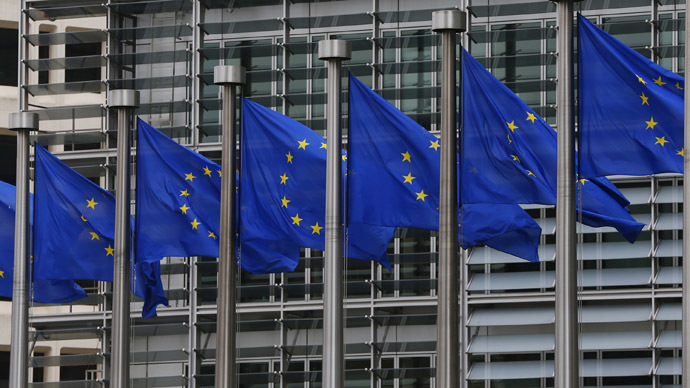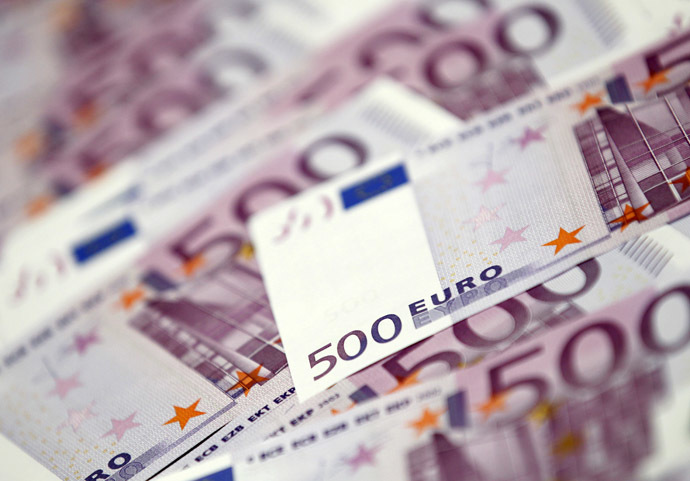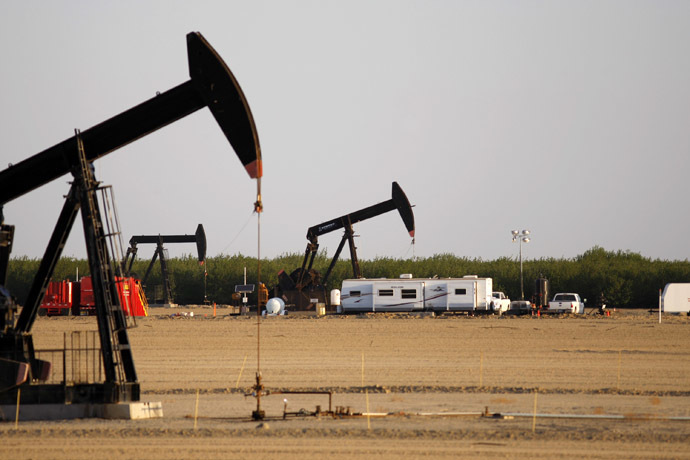‘EU may become an increasingly declining part of the world’

The eurozone has huge problems and is holding back the global economy from growing, however the world in general is doing ok, Jim O'Neill, former chairman of Goldman Sachs Asset Management, told RT.
RT:Europe's had a hard time economically in the last few years, with 2014 seeing an especially sharp slowdown in growth. What's behind this poor performance?
Jim O'Neill: The really new marginal story is Germany actually. Some of the other elements why Europe is still so weak have been similar, however, the big story is how sharp the slowdown in Germany has been, which of course probably says something about other parts of the world as well, given that Germany is such a big exporter. Maybe some of the problems that are going on involving Russia itself, Ukraine and countries east of Germany. Elsewhere you have got an ongoing weakness, in other big countries, in Italy in particular.
RT:Germany has been considered as the EU’s powerhouse. How did it happen that it has become so sluggish?
JO: On one level it’s relatively cyclical. In my own view, the underlying problem reflects something a bit more substantial. Germany is a fantastic exporter, that everybody knows, and that’s great when everybody that you are exporting to is doing well, but when countries you are exporting to have problems, Germany sees the impact pretty quickly and in some ways more dramatically than anybody else. That’s why Germany is slowing. Some people may think “Well, it’s only temporarily”. The deeper problem I refer to is that Germany is a third of the eurozone; it’s the fourth largest economy in the world after Japan, China and the US, and it shouldn’t be so dependent on exports. Germany should be a much bigger engine of the economic activity for the eurozone. What this highlights is Germany’s excessive dependency on exports.

RT:According to statistics, Germany has had the strongest export rates. Do you think that’s the reason for Germany’s relative stability? And are the sanctions against Russia playing a big part in Germany’s slowdown and the EU's current economic turmoil?
JO: It’s a very good question. I think it’s a little bit of a mental thing that German policymakers sort of see it as a kind of virility symbol. Of course a lot of the rest of the world, I’m talking from the UK, are envious, they would love to have some of that export strength themselves. The UK needs to do that to get out of some problems; the US needs it, France, Italy, Spain… Everybody else would sort of give so much to be as good an exporter as Germany. And the Germans therefore think it’s a great thing because everybody wants to be at least partially as good as the Germans are.
The sanctions appear to be having quite an impact. That’s partly the reason why Germany’s export slowdown is taking place; it can be translated to some declines in exports to Russia and Eastern Europe. So yes, it’s definitely part of the equation. What is interesting is that Chancellor Merkel after being perhaps initially very reluctant about sanctions for this very reason appears to not be too perturbed by the fact this is happening. It seems to me that she is quite happy to be tough about this topic these days.
RT:Is the world teetering on the edge of another global recession?
JO: It’s tricky because below this of course there are so many persistent unresolved problems going on in Europe. The one that increasingly bothers me is Italy. Italy in many ways has had a slow burning crisis in terms of no growth. But it’s not really had a big debt crisis in the way we saw with Greece, Spain, Portugal and Ireland. Yet Italy is 132 percent GDP in terms of its debt ratio. Without nominal GDP growth at some point this could become a huge problem not just for Italy but the whole of Europe. So Europe certainly cannot just sit there and accept almost persistent economic recession. The point at which they are going to have to think about something dramatic to change it is hard to say - but it’s getting closer rather than further, that’s for sure.
Speculation on China’s ‘slowing’ growth is ludicrous
RT:You coined the BRIC concept, now expanded to BRICS... With the exception of India, growth is now predicted to slow in the BRICS countries. Does this mean they are no longer the up-and-coming economies they used to be?
JO: I do not agree with this premise at all. One of BRICS, Russia, has quite a lot of problems; to some extent they are partially self-inflicted economically because of the sanctions. Brazil has got problems, and the two of them together share problems with commodity prices being weak. But they are only two of the five BRICS and the other two - each has more than a billion people are doing pretty well. India is showing signs of accelerating; India had some additional data better than expected. On contrary to the pessimism that people generally discuss about China is “slowing” to just below 7.5 percent is kind of crazy. China is already nearly a ten trillion dollar economy in terms of GDP size. China’s growing by 7.5 percent is equivalent globally to what the US impact would be if the US was growing by four percent. I don’t understand why people think this way, it’s kind of ludicrous. China is doing very well even though it’s showing slower growth and India is accelerating. So two of the BRICS have got problems but I don’t think it’s an issue about the BRICS collectively as a way of people think about it.
RT:Would the current situation change the general economic picture? Probably we’ll see some new fast-growing economies that might become new economy engines.
JO: Not in the slightest. The two biggest economies in the world are the US and China. As I have said China is growing something like by 7-7.5 percent, the US looks - although it’s not the same every week – as accelerating. It is growing by a sort of 3 percent vicinity. These two countries together make nearly a half of global GDP. India is accelerating; some other emerging economies such as Indonesia are doing quite well. Mexico is showing signs of picking up, the UK is going through its strongest growth since the crisis of five years ago. So yes, we have some big problems in the eurozone which are holding back the world’s economy from growing more like four percent than three, but the world is doing ok.

RT:Well, many experts say that the US economy is in a very poor state with a huge debt and slow growth rates. What’s your take on that?
JO: People can find problems virtually always and anywhere they want. I read this kind of thing and I don’t think it stands for a proper and objective analysis. If you think about the crisis in the way we have come in the last five years, the real problem with the debts is that the US had this never-ending rising current account deficit and external debts, with it a rapid rising fiscal deficit which of course got bigger on the back of the currency getting worse. If you look today the US current account deficit is about two percent of GDP – more than 2/3 lower than what it was in 2008. And its own fiscal deficit in contrast to Europe has shrunk considerably because the US has managed to achieve growth. I think the US is in a much better shape than it was five years ago, and generally speaking, it’s in a much better shape than I see most people talking about. Even though the US hasn’t got gangbuster growth of what it used to hope for, but given the adjustments and changes it needed to do, it’s pretty impressive, as is the adjustment and change going on in China. We have huge problems in Europe as we have touched on but Europe is not the world, luckily, and in fact if it carries on this way it’s going to become an increasingly declining part of the world.
Declining oil prices is positive for the majority of the world
RT:Oil prices are currently plummeting. Which economies suffer the most from this situation? How bad is that tendency for the world economy?
JO: Even though it is a real problem for oil producers, declining oil prices are essentially a very positive thing for the majority of the world for two reasons. One is because it helps to keep inflation really low. Secondly, with that it effectively acts as tax cuts for consumers in oil importing countries. You can imagine how a lot of low-income people when they [are seeing low oil prices seem] probably feel wealthier. So that’s definitely a bonus for many parts of the developed world, including actually Europe of course. For oil importing countries it’s therefore a good thing, for oil exporting and producing countries it’s obviously a bad thing.

Just as it was likely that they wouldn’t benefit from it persistently assuming the oil prices will go up, and when we now see a reality of what happens when they go down. No doubt that at some unpredictable point in the future oil prices might start going up again. Personally, having spent so long thinking about financial markets, one of the things I learned is don’t keep believing you know where oil prices are going because it’s almost impossible to forecast. That said, I thought three years ago that the oil prices had peaked and would go down to 80 dollars a barrel which is where we are broadly at today. I think we might have some more weakness coming in the next couple of months just because of the share momentum but we are probably not far off most of the decline. When you get moving towards 70 dollars per barrel, a lot of alternative energies start to become less economical and the supply problems in those areas start to grow. So I think there will be some sort of self-correcting mechanism at some stage and we are probably close to the bottom of this move rather than beginning of a sustained slight from here, but who knows.
RT:Are there also political reasons behind the drop in oil prices?
JO: I think this plays a role. Politics always plays a role in oil prices, and that has not changed today and it never will. At some point the most important issue that affects oil prices is the marginal cost of producing oil and alternatives. The really big thing that caused prices to drop in the past three years has been China shifting to a different style of economic growth where they don’t demand so much energy, and of course this rapid growth of alternatives. If oil prices go down, the rapid growth of alternatives is under threat, and that is an underlying issue. The politics in the US are deliberately encouraging the Saudis to produce more maybe plays an important marginal role, but I don’t think it’s a key driver.
The statements, views and opinions expressed in this column are solely those of the author and do not necessarily represent those of RT.
The statements, views and opinions expressed in this column are solely those of the author and do not necessarily represent those of RT.












